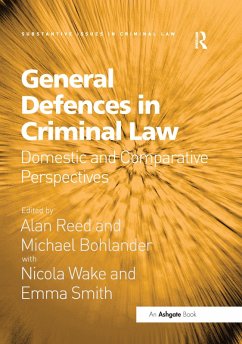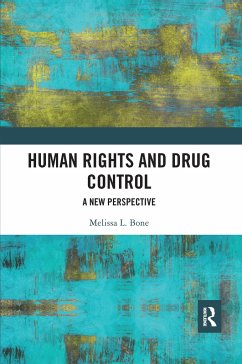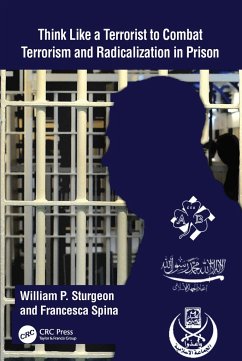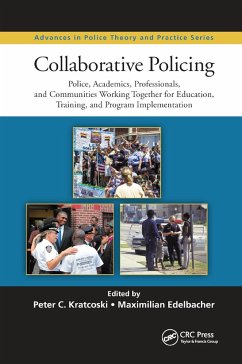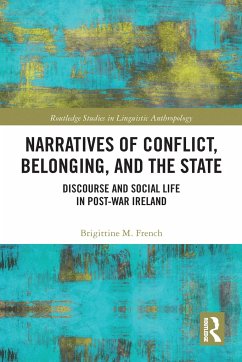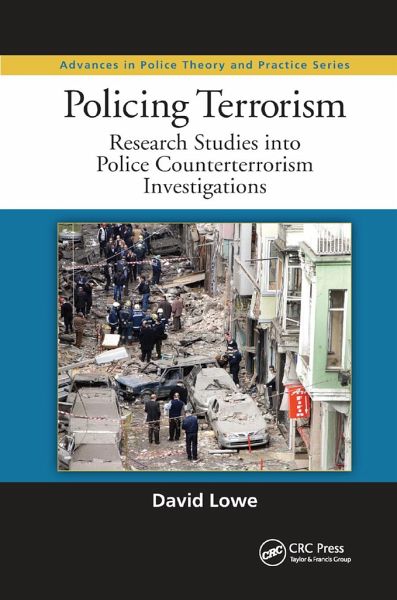
Policing Terrorism
Research Studies into Police Counterterrorism Investigations
Versandkostenfrei!
Versandfertig in 6-10 Tagen
51,99 €
inkl. MwSt.
Weitere Ausgaben:

PAYBACK Punkte
26 °P sammeln!
Based primarily upon information from the UK Special Branch Counterterrorism Unit, Policing Terrorism: Research Studies into Police Counterterrorism Investigations takes you through the mechanics of a counterterrorism investigation. A combination of legal and empirical research, this entry in the Advances in Police Theory and Practice book series examines subjects that include surveillance, intelligence gathering, and informants. It also addresses practical obstacles in counterterrorist investigations.The first section of the book conducts a comparative study of laws governing terrorist invest...
Based primarily upon information from the UK Special Branch Counterterrorism Unit, Policing Terrorism: Research Studies into Police Counterterrorism Investigations takes you through the mechanics of a counterterrorism investigation. A combination of legal and empirical research, this entry in the Advances in Police Theory and Practice book series examines subjects that include surveillance, intelligence gathering, and informants. It also addresses practical obstacles in counterterrorist investigations.
The first section of the book conducts a comparative study of laws governing terrorist investigations in the UK, US, Canada, and Australia. It compares the legal definition of terrorism in each country and how it has been incorporated into the statutes regarding terrorism-except in the case of the US, which has not established a definition of terrorism. The book locates similarities in the legal jurisdictions of cooperating countries and discusses how legal gaps can create difficulties for international cooperation.
The second section contains empirical studies on practical aspects of terrorist investigations and the activities of terrorist organizations. It evaluates operational officers' discretion in using the powers granted to them and analyzes terrorist organizations' methods in radicalizing and recruiting people to their causes. It also explores the critical role of informants in gathering intelligence, covering a broad range of issues including integrity, risk assessment, ethics of handling informants, police interrogation of suspects, and the use of informants at trial.
With many governments currently at a high threat level, increased international cooperation among counterterrorism agencies is imperative. Policing Terrorism presents several pathways to generating more effective cooperation. It provides you with information on factors that help or hurt cooperation while suggesting what can be done to improve curr
The first section of the book conducts a comparative study of laws governing terrorist investigations in the UK, US, Canada, and Australia. It compares the legal definition of terrorism in each country and how it has been incorporated into the statutes regarding terrorism-except in the case of the US, which has not established a definition of terrorism. The book locates similarities in the legal jurisdictions of cooperating countries and discusses how legal gaps can create difficulties for international cooperation.
The second section contains empirical studies on practical aspects of terrorist investigations and the activities of terrorist organizations. It evaluates operational officers' discretion in using the powers granted to them and analyzes terrorist organizations' methods in radicalizing and recruiting people to their causes. It also explores the critical role of informants in gathering intelligence, covering a broad range of issues including integrity, risk assessment, ethics of handling informants, police interrogation of suspects, and the use of informants at trial.
With many governments currently at a high threat level, increased international cooperation among counterterrorism agencies is imperative. Policing Terrorism presents several pathways to generating more effective cooperation. It provides you with information on factors that help or hurt cooperation while suggesting what can be done to improve curr







